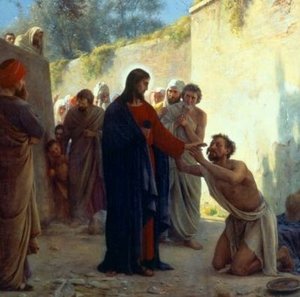 Jesus restores sight to a blind man near Jericho
Jesus restores sight to a blind man near Jericho We’ve been praying for rain and God has answered our prayers: thanks be to God. Yesterday I hiked up Santa Paula Canyon and found six hikers stranded on the wrong side of the raging Santa Paula Creek. They had a rope so I was able to pull them through the water one at a time to the other bank. God has reminded us how precious water is, and how necessary his grace is.
Deus Caritas est
We have come to the last Sunday before Ash Wednesday, called Cuinquagesima, because it is 50 days before Easter. Eastertide itself will stretch 50 days after that until Pentecost, so we are looking down a broad 100 day sweep of sacred time, almost a full third of the calendar year. Are we prepared to enter onto this river of grace?
The Epistle for Cuinquagesima is St. Paul’s great hymn to Christian charity, his sacred ode to Divine Love, which most fiancés choose for their wedding Masses: “Love is patient, love is kind; it is not jealous, never rude, not quick-tempered. Love never fails.”
Do you know any marriages that reach this perfection of love? Some get pretty close, after years of fidelity, but many never get past love’s adolescence. Starry-eyed brides choose this reading because they imagine their husbands will never be rude to them, never grow impatient, and never fail. More thoughtful brides know quite well that their husbands cannot measure up to this kind of love; they choose this reading because it speaks not of human, romantic love, but of divine, sacrificial love. These more thoughtful spouses know quite well that without God, without desperate prayer to Him, their marriages will quickly fall into misery. I’ve worked a good deal on Retrouvaille weekends, a workshop for spouses on the edge of divorce. On Friday night the eyes of those couples are dull with disillusion and misery; by Sunday afternoon, they are all smiles. “I’ve tried it my way,” one man said, “and I give up. I’m ready to try it God’s way.” “At present I know partially,” St. Paul says. “Then I shall know fully, as I am fully known.” The love St. Paul describes is not humanly possible. It is God’s love in us.
Love in action
God puts his love into action in the Gospel. First Jesus tells his apostles he is going to Jerusalem to be crucified, the fullest expression of his love. He dies for love of his Father and for those to whom his Father sent him. But then the Gospel gives us a little side incident. Jesus notices a ragged roadside beggar, the kind you see at the 10th street off-ramp in Santa Paula. He sees the beggar that most of us do not even see. He sees him, he talks to him as a man, and he heals him. Mother Teresa noticed a man dying in a Calcutta gutter, one man in a city of 13 million men. She picked him up, washed him, fed him, and looked at him. He looked back at her and asked, just before he died, “why are you doing this for me?” “Because I love you,” she replied.
Lent is for Love
The Church gives us these two readings on love three days before Lent begins to point out the purpose for this forty-day retreat. It is not merely to “give up something,” like sweets or television. Lent’s essential purpose is not to test our will power, but to increase our love for God and neighbor.
Jesus will say to us in the Ash Wednesday Gospel that we must fast, pray, and give alms if we are to be close to our heavenly Father. Fasting prepares the ground; it cleans out the soul so that God can find a place within us. Not even Almighty God can enter a heart that is already full. Fasting is not an end in itself but only a means, and yet many Catholics think of Lent as only “giving something up.” Fasting makes real prayer possible, so that we are capable of receiving God. And most of see Lent as fasting and prayer, but there is a third step most of us miss. The third step is almsgiving, the most basic form of which is giving money to the poor. Catholics generally ignore the Bible’s injunction to tithe, but giving alms is a necessary baseline through which we prepare to give more than our money. Fasting, prayer, and tithing prepare us to give ourselves to God and neighbor.
So these three: fasting prepares our hearts; prayer fills those hearts with God, and almsgiving gives God to others from our hearts. The final end of Lent is love: love of God in prayer, and love of neighbor in almsgiving. Let us begin Lent with the end in mind: to love God with all our heart, all our mind, and all our strength, and our neighbor as ourselves.


 RSS Feed
RSS Feed